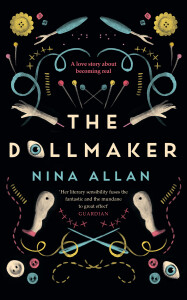
I looked forward to reading this novel because of its experimental structure. It turned out to be a labyrinth of stories within stories, dizzying reversals and reveals, counterpoints and echoes. Even more than usual, I felt that as a reader I was an active participant in creating the story as I read.
At an early age Andrew Garvie began collecting dolls. His parents eventually came around to appreciating their only child’s preoccupation, recognising that his dwarfism limited his social life and his expertise actually led to a valuable collection. Andrew also begins to make exquisite dolls, sometimes restoring antique dolls.
He comes across an ad in the personal pages of a trade magazine requesting information about a Polish writer and dollmaker named Ewa Chaplin, and begins corresponding with Bramber Winters who says that Chaplin “seemed to know that dolls are people just like us.”
As they exchange letters, Bramber reminisces about her childhood and describes people who live in the same house with her now, though she leaves us—and Andrew—to guess if it is a boarding house or an institution of some kind. After a year of this, Andrew declares that he “understood that we were destined to be together.” He sets out on a quest from London to where she lives in Bodmin in Cornwall.
The book is a mix of Bramber’s letters, Ewa Chaplin’s dark fairy tales (included in full), and Andrew’s own memories, descriptions of dolls he’s made, and his encounters as he travels from London to Cornwall.
I find dolls quite eerie myself and as a child had nightmares about them. Once I had to leave a store in Toronto because the walls were festooned with doll heads made into clocks. Yet they are a potent image, especially in this context of stories within stories of dwarves and princesses, of solitude and unlikely connections.
Their otherness—people but not quite—keeps dragging us away from the strangeness of these two people who have never quite fit in, making us question what “normal” means in a world where magic might be real and fetishes quite common.
Nothing is quite what it seems, and often I found myself lost in the funhouse—in a good way. I appreciate that much is left unsaid so that that the reader cannot avoid engaging with the story and contributing to it.
Have you read a novel that incorporates myth and fairytales?